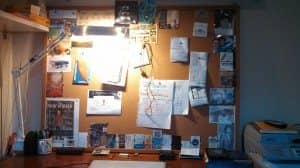Podcast: Download
Subscribe: Apple Podcasts | RSS

Richard Gilzean, long time friend of the Magnetic Memory Method and the man behind the delightful blog peeleye, recently shared with me some great writing he has done to chronicle his adventures in using memory techniques and related skills like juggling.
How are memory techniques and juggling related?
Read on to find out.
And a Magnetic thanks to Richard for not only sending this to me and allowing me to post it on the site. I’m proud to make it the first Magnetic Memory Method Guest Post ever and know that you’re going to love reading these reports from a memorizer making great strides with the techniques. Richard is an inspiration to us all.
Hanging Out With My Magnetic Memory
By Richard Gilzean
28 July 2014: Where to start with this recollection on what I have learnt about myself over the past 12 months? The idea came to me this morning on the train as I was commuting in to work. While passing over the Sydney Harbour Bridge and looking out over the harbour, I was listening to the podcast interview between Anthony and Kerstin Hammes. Just after Anthony had explained what a “John Henry” was to Kerstin, she suggested that language learners can benefit from keeping a journal of their efforts in order to better see and appreciate where they have come from in their respective journeys.
What a cool idea, I thought. I’ve been on my own personal development journey for almost a year and it is as good a milestone as any to take stock and recount what has happened. (Although in reality it is a process I have been undertaking with varying degrees of application for many years).
In my case a whole bunch of factors came into play, not one particular flash of inspiration. I had wanted to get back into studying German language, but in a way that was different from my past efforts of going to classes, studying stacks of flash cards and reopening the German text books which had taken over a shelf in my study. There had to be another way.
It was around this time that I came across Anthony’s book How to Learn and Memorize German Vocabulary: … Using a Memory Palace Specifically Designed for the German Language (and adaptable to many other languages too) on Amazon.
29 July 2014
In embarking on this quest for self-improvement, mastery, getting-my-act-together, call it what you will, I found myself quickly inundated with information and opportunities to explore this open-ended field of inquiry. I browsed the websites and purchased a bunch of e-books on memory improvement/training.
Last October I watched the television documentary series Redesign my Brain on the ABC (Australian Broadcasting Corporation). From within the topics explored, including visualization, mnemonics, magic and memory training, I became interested in the art of juggling. After a few weeks of tossing and catching and dropping I became a reasonable 3 ball juggler. But more importantly I was reminded of the values of concentration, regular practice, focus, relaxation and keeping it simple.
More recently, in one of his newsletters, Anthony disparaged that hoary notion “If something is worth doing it is worth doing well”; rightly noting that it is a load of old cobblers. Juggling tells me that something worth doing is invariably preceded by failure and persistence. Embrace failure people, because failure gets you closer to what you’re good at.
30 July 2014
Slow Hand. Did I want to memorize a couple of packs of playing cards in under two minutes like those described in Joshua Foer’s Moonwalking with Einstein?
Not really.
But I did like the idea of impressing family and friends by being able to shuffle a pack of cards and casually rattle them off one by one. So I followed the tried and true mnemonic system of associating each card in a deck to an image, rehearsed it a couple of times and now I have all 52 cards locked in – plus the joker for good measure. I’m still pretty slow at it after almost a year and so I still need to keep up the rehearsal – keeping my hand in, so to speak.
I find using a deck of cards a great way to remember places that I have visited and spent some time in and which I want to use as Memory Palaces. The other day I went to the local Austrian Club – Community Cultural centre for a birthday lunch with a bunch of friends and their kids.
While tucking into my Schnitzel and Weissbier and with an acoustic backdrop of yodeling music on a stereo loop, I made a mental note of the large hall which included a “Herzlich Willkommen” reception, Stammtisch, dance floor with band stage, drinks bar, maps and flags of the Austrian regions, air rifle trophies, several mounted animal heads and a painting of people sitting at a table that looked like it had been knocked out by one of the locals after one too many ales. With my pack of cards I have spent an enjoyable half hour recreating such Memory Palaces, as well as holiday houses, places from my childhood, museums, cafes and the local art gallery.
31 July 2014
Geography, poetry and the in-laws. One of main goals for wanting to improve my memory has been to increase my overall ability to communicate in German. One of the first exercises I undertook after reading Anthony’s book on how to memorise German was to memorise the 16 Bundesländer together with the names of each capital city. I chose the house of my partner’s long deceased Tante Annie in Munich.
I never met Annie, but I did get to spend a couple of excellent summer holidays there a few years back. Her house has also become my Memory Palace for all of my German vocab words starting with the letter ‘a’. Even though Annie’s old house has now been knocked down and replaced with a bunch of townhouses, I will always have a strong imprint of all the rooms and apple trees in her house and garden.
I have also memorized poems both in English and German. Not a huge repertoire to date, it includes Shelley’s Ozymandias, the German children’s poem Der bitterböse Friederich from the Struwwelpeter book of poems and Heinrich Heine’s Die Lorelei – about a guy in boat with an unhealthy obsession for a girl. Armed with this new knowledge, I have tested my partner’s knowledge of the German states (she didn’t pass) and entertained my mother-in-law with a recital of Die Lorelei (she was very impressed with her son-in-law).
1 August 2014
The Memory Wars. 6am. I slide out of bed, shuffle downstairs and crack open the smart phone. There, in my inbox, sits my Magnetic Memory Newsletter; as regular as the ravens, kookaburras and lorikeets making a racket outside my window. This morning’s post is not Anthony’s usual considered replies to someone’s magnetic memory question, but a spirited defence of the daily newsletter against the detractors and critics who have ‘issues’ with his approach.
Personally I don’t have a problem with the format of the newsletter. On some mornings I will quickly scan the text, satisfy myself that I’m across the main point and hit delete. But usually the points raised are of interest and I’ll read a bit more closely and save the post for future reference. I recently read an article which argues that we live in an age of warring internet tribes. Whether it’s climate change, immigration, religious belief or the kind of pet you have, people are going to have entrenched positions and whose opinions cannot be changed.
I guess memory training and approaches to learning are not immune to blog wars and forum stalking. It’s not just that we differ, but our sense of self is developed in our disagreements. Conflict is inevitable, but disagreement can still be productive. Which, in my mind at least, is what I took away from this morning’s post.
Personally I’ll stick with Anthony’s daily newsletter. His commitment to the cause confirms for me that he practices what he preaches.
2 August 2014
By now I have come up with more that enough memory palaces to serve as staging posts for all the things I want to be able to remember and use. I’ve already mentioned Tante Annie’s house, but there is also the house I live in here in Sydney, my parent’s apartment block, my son’s local scout hall, the swimming pool, the places of my youth and journeys around my neighbourhood.
Cafes are handy, as are cinemas and my daily commute from home to office. They are all listed on a spreadsheet and some are used more than others. I have a very large cork board sitting over my office desk (measures about 1m x 1.5m) and around the edge I have pinned a collection of business cards, postcards and photos, 35 in total.

5 August 2014
Flash celebrities over at the school. Another website that I subscribe to is German Flashcards run by Antosch-and-Lin.com. The site turns out a daily newsletter containing a word and phrase of the day and is designed for the spaced-repetition brigade. I wrote a blogpost for their site a few months ago about my experiences and struggles with learning foreign languages over the past 24 years.
You’re welcome to have a look at Wrestling the Bear, Part 1 of what plan to be a three part series. Armed with the daily phrases that I consider to be useful and which add to my vocabulary, I have compiled a hefty list.
But how best to memorize them? My solution has been to create an A-Z spreadsheet of famous names and people I know and assign a phrase to each of them. (I’m not sure where AM – Anthony Metivier fits in – famous or people I know – but you’re in the mix). Each name / phrase is then placed on a route that runs from my front door and heads out towards my son’s local public school, a Memory Palace I am very familiar with.
So far I have gone from Andre Agassi to Conchita Wurst. With the exception of Q – X – Y (too hard), I have most of the spreadsheet filled with names. However, if someone can suggest a name with initials IO I’d be grateful.
6 August 2014
Meet Bob the Builder Roman Soldier. Of all the positive benefits I have achieved over the past couple of months, without doubt the most personally rewarding has been being able to impart my learnings onto my nine-year-old son. Math is not one of his strengths, and my wife and I have invested a lot of time and energy in helping him to stay on top of the topics covered in the class.
Towards this end, and in part inspired by Anthony’s interview with the young girl who memorized all of Shakespeare’s play and sonnets, I have had some wins in using the Magnetic Memory Method to help with times tables, shapes and volumes. My son is now getting the hang of creating his own memorable characters, including Bob the Roman soldier, who walks through his mapped-out classroom and nominating stations for the Roman numerals I V X L C D & M and figuring out how the sequence of Roman numerals operates.

I wish I had been shown how to use my mind to memorize all the stuff that they threw at me during my school years. I wish I had been show how to study properly, period. I am determined to make sure that my child will be able to realize his potential and dreams without the stress and pressure that hangs over the education system like a heavy cloud. So I lend my wholehearted support towards the idea that mnemonics – and the Magnetic Memory Method in particular – have a worthwhile and important place in the education toolbox, regardless of whether you are 9 or 59 years old.
So that just about sums up what I have achieved in a relatively short period of time. My German vocab excel spreadsheet continues to grow and I still find the whole process mostly fun, even on those days when it seems like some word is not sticking despite repeated attempts to recall. Just remember that it is not a race and to relax. As for the future, well I have a desire to memorize all sorts of things including music, Japanese, Italian, chess patterns and especially my command of my mother tongue.
About the author: Richard has a background in fiction writing, ESL teaching and mnemonics. He has a love of all things German, believes that more men should wear proper hats, and would never be want to be called a ‘polyglot‘ because it sounds like a pathological condition. Check out his post on memorizing German phrases for an updated tutorial on his progress with learning, memorizing and recalling German en masse.



